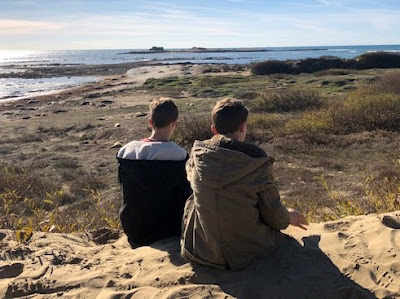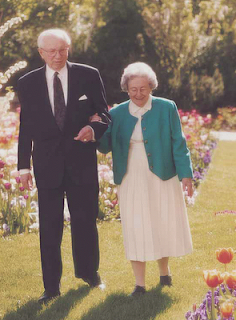Repentance and Forgiveness in Families
Repentance and Forgiveness in Families
Families are the proving grounds for us to learn to be more
Christ-like. It is in our homes and relationships there that we can learn to
repent and forgive. “Repentance and forgiveness are divine expectations
that are particularly relevant to family life.”1 We all have need to repent, we
all make mistakes. When we strive to seek to be more like Christ, we will learn
valuable lessons from our familial experiences to be more like Him.
Many of the greatest lessons that I have been able to learn
come from the heartache of my father's decisions. As a young teenager my father
asked to be released from his calling in the Stake Presidency and soon after
moved out of our home and our lives. I would see him occasionally, but I didn't
look forward to it. He had chosen a life outside of the gospel and my
heart could not reconcile the juxtaposition of the father I knew, and the
glimpses of a father I did not know.
Life can offer difficulties and sometimes those
difficulties can be an emotional earthquake that leave us in an emotional and
spiritual vertigo. This was an earthquake, to cope with the grief of what
was, to frantically searching for something to secure to hold on to. Through
years of pain and trying to make things better I came to know that I had to
seek what my Father in Heaven wanted for me. Only through Him and my
Savior could things be right.
One of the great lessons I learned from turning to my
Father in Heaven is of repentance and forgiveness. I suggest that when we
read the scriptures, we try to read them with the knowledge that we are
personally capable of being the perpetrators in the scripture stories, the very
worst of them. When we approach them this way, we can come to the
knowledge that we have the capacity to do the same evil. What will
separate us is the knowledge that we are capable of the same awful things, but
we choose to overcome the natural man. We can forgive more easily when we see
our own vulnerabilities and capacity to sin. We can overcome ourselves when we
are aware of the weaknesses we need to conquer.
Because I could love my father from a place of forgiveness,
I could learn of his heart aches and struggles. My heart hurts for the
pains he has had in his life from even a young child. I could
re-establish a relationship with him again and be grateful for the
differences. I am grateful to have been able to learn to love someone
with boundaries. While he still lives outside of the gospel and openly
contrary to my gospel beliefs, we have both been able to be respectful and
loving. It taught me a new depth of empathy for my father and everyone
around me.
Through this heartache and triumph my children have lived
on the frontlines of learning to love others who live and think differently,
through the close watch and guidance of faithful loving parents. They
learned that we can have boundaries and offer acceptance and love. My
children have also witnessed the impact and scope our consequences can have
from our decisions.
Our Father in Heaven will make us who he needs us to be. As
Elder Holland so beautifully states, "Surely each of us could cite and
endless array of old scars and sorrows and painful memories that this very
moment still corrode the peace in someone's heart of family of
neighborhood. Whether we have caused that pain or been the recipient of
the pain, those wounds need to be healed so that life can be as rewarding as
God intended it to be."
As we strive to live the gospel, we have the capacity to extend
a loving arm of compassion and allow an avenue for those who have left the
gospel to return. We can each be as the father of the prodigal son hoping
and watching with a loving home prepared for the return of our loved one. It is
through that same love and forgiveness that we can strengthen the bonds and
heal the wounds of our inevitable small or large offenses. We choose our
eternal families when we choose repentance and forgiveness. As we seek
Him, we choose to allow Him to make us who he intends us to be.
1 Hawkins, J.H., Dollahite, D.C., Draper, T.H., Successful Marriages and Families: Proclamation Principles and Research Perspective
2 Holland, J.R. (2019, June), Helping Others Forgive: A
Therapist’s Perspective, Ensign



Comments
Post a Comment